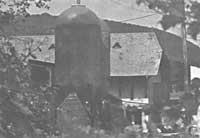Talking to Andrew Willetts about biotechnology
specialty of Dr. Willets, "Biochemistry of microbes of industrial interest", he has carried out important research on the degradation of polyethylene glycol by fermentation to obtain the production of butane 2,3 diol. And taking the carbon of methanol as a source of protein production.
He has worked on these studies and worked on projects with powerful ICI and BP industries, and thanks to these actions he has been able to gain valuable University-Business experience. Thanks to the exchange program between the
British Council and the Basque Government, we had the opportunity to invite Dr. Willetts to the Basque Country for two weeks. Below were the most outstanding industries at the biotechnology level of the Basque Country, mainly in the areas of paper, wood and land cattle. In
this interview the impressions of Andrew Willetts are collected analyzing the possibilities that our country can take from a biotechnological point of view.

Willetts.- Biotechnology is a field of applied biosciences. It includes the practical application of biological organisms or their intracellular components, from industrial manufacturing to environmental management. Biotechnology encompasses fermentation processes (beer, wine, cheese, antibiotics and vaccines among others), water and waste treatment, food technology and a rapidly expanding area such as metal recovery. Successful application of biotechnology requires the integration of many scientific disciplines. These include microbiology, genetic biochemistry, molecular biology, chemistry and chemical engineering.
Elh.- What do you think biotechnology can contribute to the future of humanity?W.- Biotechnology produces a large number of expanding industrial areas, including agriculture, food industries, the pharmaceutical industry, the energy industry and water treatment. It will have an important role:
- Production of new drugs, hormones, sausages and antibiotics. In the
- environmental control and more appropriate waste treatment.
use of antibiotics and in the exploitation of a more manageable and economic and

Biotechnology will focus mainly on recoverable and recyclable materials, that is, on meeting the needs of a world where resources are scarce and costly.
Elh.- You come from Great Britain, that is, from a developed country. These days you have been in Euskal Herria. What is your opinion on the situation of science and research here?W.- The objective of bringing science and technology to the maximum attainable level for any country is important if you want to do as much as possible with the resources of the country. People dedicated to science and technology have a great influence in any country. As an example, and I know that as an example it is not the most appropriate, it can be clarifying to consider Japan. Japan is a village limited to herds. Its material resources are limited and thanks to its efforts it has become a world-class power.
During my stay in Euskal Herria I was impressed to see that there are people who are researching at a high level. If the influence of these people can be increased, the future of Euskal Herria is assured, whatever the situation. However, there is an important risk, especially if it is a country with limited financial resources, and there is not enough money for science, research and everything, there is nothing to think about. I will not deny it, I have met people with a negative attitude like this. One of the goals of positive people should be to eliminate negative attitudes through employment.
Elh.- As a foreigner, what are the greatest limitations that the development of Basque science and research considers?
W.- I ask you to criticize a problem that I do not know in its entirety. this can be dangerous, as my analysis can be superficial. However, I have found two phenomena that may pose limitations to the development of Basque science and research: the first, which I have already mentioned, is the negative attitude of some scientists, that is, due to problems beyond the control of their hands, they will not get anything. This is a risky trend, because it incorporates a self-compassionate philosophy. Secondly, it looks like an excessive corrupt bureaucracy (paper filling, etc. ). ), that there is a waste of efforts by scientists who want to work on scientific progress.
As this philosophy of paper filling develops, it is perpetuated. This state can change. The actual change of course from the upper levels can reach the lower levels. In this way, ideas and proposals would be generated and flourished at all levels. However, this type of action is not easy, on the one hand, for political problems related to power and on the other for psychological problems, since people are afraid of abrupt changes.
Elh.- What could be the most important or most successful field for the future development of biotechnology in Euskal Herria?W.- In the Basque Country there is an important recoverable natural resource, soft wood. A direct and close objective may be the development of technology to take advantage of the waste generated in the use of this soft wood. In the longer term it would be preferable to consider the totality of forestry. Using appropriate technologies, it is possible to find more valuable commercial uses for wood, at least better than paper pulp or existing fruit boxes.

Another future aspect of biotechnology would be sewage exploitation. The exploitation of sewage would have a double advantage: on the one hand pollution would be reduced and on the other hand useful products would be obtained.
Elh.- Research and teaching at the university are important in the development of new technologies. How has the impression of the University of the Basque Country on biotechnology been?W.- The role of the University is double. First, it should give students knowledge and practice. Secondly, students should be concerned about using their own talents in a new and innovative way.
Among the people of the University of the Basque Country/Euskal Herriko Unibertsitatea there are members with a broad vision to be able to carry a suitable and prosperous program in biotechnology. However, as in the case of my English university, the degree of success that can be achieved on this path is highly conditioned by external factors, such as government policy, factors beyond institutional control.
Buletina
Bidali zure helbide elektronikoa eta jaso asteroko buletina zure sarrera-ontzian








